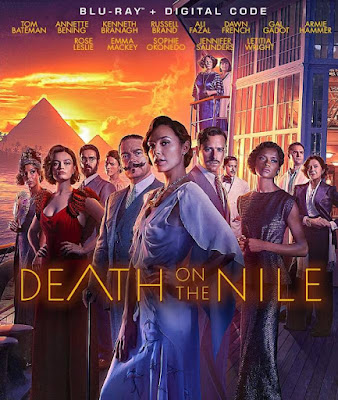Poor Superintendent Battle. He is always overlooked, even though he is probably Agatha Christie’s fourth most prolific crime-solver (after Poirot, Miss Marple, and Tommy & Tuppence). To compound the insult, ITV previously adapted Towards Zero and The Secret Chimneys as Miss Marple mysteries, leaving him out. It sort of happens again with this adaptation of the latter. Instead of the Superintendent and his nephew Inspector Leach working together, it is just Leach, who carries much more baggage this time around. However, grouchy Lady Tressilian is still a handful and she once again meets an untimely demise in the three-episode adaptation of Towards Zero, which premieres today on BritBox.
As the matriarch of her extended family, Lady Tressilian is a bit disappointed by her nephew Neville Strange’s divorce, but she still agrees to host him and his “homewrecker” new wife, Kay Elliott-Strange during their homecoming. At the same time, she also extends her hospitality to the newly divorced Mrs. Strange #1, Audrey, who lived in the seaside Saltcreek estate as a child, after her parents’ accidental deaths. Frankly, Lady Tressilian finds their mutual convergence stranger than the various Stranges seem to.
Inevitably, things get super-awkward when Neville openly flirts and charms his ex. Yet, he is much annoyed by the sudden appearance of his cousin, Thomas Royde, who continues to accuse of Strange of deliberately causing the death of their childhood playmate. Despite falling out of favor with Lady Tressilian, he has come hat-in-hand to beg for money. Through letters, he lobbied her paid companion, Mary Aldin, to his cause, while implying a romantic interest. However, he still carries a torch for Audrey Strange.
Obviously, there was a lot of tension in Saltcreek, even before Lady Tressilian called Mr. Treves, the family solicitor and sweeper-of-things-under-the-rug, to revise her will. Soon thereafter, she meets a violent, premature end. Inspector Leach will investigate, but only because his suicide attempt fails. Somehow, the powerful rip-currents spit him back onto land, rather than dashing him against the rocks. The WWI veteran remains tormented by PTSD and survivor’s guilt, but his suspects’ entitled smugness quickly sharpens his edge.
Compared to some recent Christie adaptations (especially Ordeal by Innocence), this Zero is relatively faithful, but Pascal Thomas’s French adaptation is still superior—and it allowed good old Battle to be good old Bataille. Nevertheless, it is nice to see a veteran play a major role in a series that is not inherently military-themed—even if he is a veteran of the First World War.
Regardless, screenwriter Rachel Bennette fully embraces Christie’s central theme, exploring the precipitating issues that give rise to the murder, just as much as the investigation. This production is well served by Clarke Peters’ stately voice explaining “point zero” as the moment “the murder is seated.” Considering Neville Strange is a professional tennis player, he might have called it “point love,” but that might have confused the less sporting. Bennette still capitalizes on the tennis connection, gathering all Leach’s suspects around the Saltcreek court, instead of the drawing room.
This is also a consistently strong cast, starting with Peters, who perfectly personifies Mr. Treves’ dignified craftiness. Though not Battle, Matthew Rhys is deeply compelling as the haunted but still incisive Insp. Leach—essentially, he is like a tragic Interwar Columbo.





















